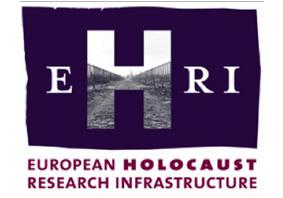EHRI - European Holocaust Research Infrastructure
Launched in November 2010, the European Holocaust Research Infrastructure (EHRI) is a four-year project aimed at supporting the European Holocaust research community by establishing unified online access to dispersed sources relating to the Holocaust all over Europe and Israel, and by encouraging collaborative research through the development of tools. To achieve this by 2014 twenty organizations – research institutions, libraries, archives, museums and memorial sites – from thirteen countries will work together.
Holocaust studies rely more than most other fields of research on a huge variety of archives. Holocaust archives are fragmented and scattered all over the world, making access complicated and very time-consuming. The fragmentation of sources does not only result from the fact that the Holocaust was not restricted to one place or country, but also from the Nazi attempts to destroy the evidence, and the migration after the Second World War of Holocaust survivors. After the war many different projects have been set up to document what actually happened. In the recent decades, even more specific collections have been established, especially in regional centres. Further to this, Eastern European archives have now opened up. Unfortunately there is no uniformity in cataloguing and describing. Many different languages are used in the original documents as well as in the cataloguing systems. Finally, one of the major challenges for Holocaust researchers is to avoid the domination of the perpetrators’ sources over the voices of persecuted Jews whose documents often followed the fate of their owners: they were in many cases destroyed or dispersed.
Following the excellent work done by many organizations throughout Europe and Israel in collecting and saving documents, objects, photos, film and art related to the Holocaust, EHRI will enable bringing all these sources together and taking the research into this area several steps further. To this end, EHRI will design and implement a Virtual Research Environment (VRE) offering online access to a wide variety of dispersed Holocaust archives and to a number of tools to work with them. Building on integration programmes undertaken over the past decades by the twenty partners in the consortium and a large network of associate partners, EHRI sets out to transform the data available for Holocaust research around Europe and elsewhere into a cohesive body of resources.
An important condition for making a success of EHRI, is an interdisciplinary structure. The scholars involved in EHRI are not only trained historians and political and social scientists but also archivists and digital research infrastructure specialists. The collaboration between historians, archivists and IT specialists is crucial to EHRI’s ambition.
In EHRI, the work of DCU addresses:
- The identification of the key stakeholders with which EHRI needs to engage
- The identification and analysis of scholarly research practices and use of archival materials in the area of holocaust studies
- The identification and analysis of scholarly research practices in the digital domain and how these might support and enhance research in Holocaust studies
- The creation of a set of data and functional requirements based upon the analysis of scholarly research practices
Original location: http://www.ehri-project.eu/




